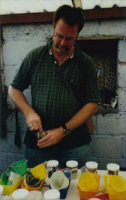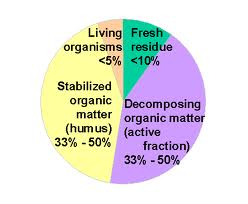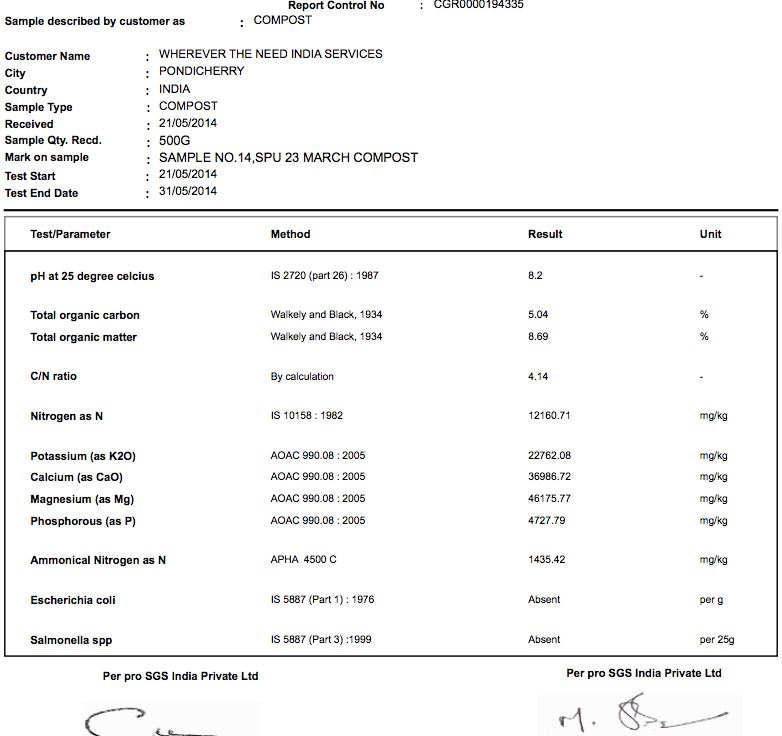- Sanitation systems
- Toilets without urine diversion
- Comparisons of various toilet types
- How should we call the excreta-derived product of a composting toilet or a UDDT? Do we need a new term?
How should we call the excreta-derived product of a composting toilet or a UDDT? Do we need a new term?
106k views
- joeturner
-
 Less
Less- Posts: 717
- Karma: 23
- Likes received: 185
Re: How should we call the excreta-derived product of a composting toilet or a UDDT? Do we need a new term?
I'd say humus is also a bad term. Faecal material which has been in storage for a long time might be essentially stable (or maybe even 'finished' or 'cured' as compost) but equally may not be. In a UDDT the material has dried without much microbial activity, particularly if the pH is high. I doubt this chemically or physically resembles true soil humus.
From what David Bates has shared with me, the chemical properties of the material in a UDDT will depend on the age, the materials added and other factors. I am not sure that using an existing term for this very variable material is going to be anything other than misleading.
It is not really compost, it is not really humus, it is no more eco than anything else, the agronomic value will depend on the chemical and physical properties.. etc.
Maybe you are just better inventing a term which has no previous meaning like biosolids.
From what David Bates has shared with me, the chemical properties of the material in a UDDT will depend on the age, the materials added and other factors. I am not sure that using an existing term for this very variable material is going to be anything other than misleading.
It is not really compost, it is not really humus, it is no more eco than anything else, the agronomic value will depend on the chemical and physical properties.. etc.
Maybe you are just better inventing a term which has no previous meaning like biosolids.
The following user(s) like this post: Carol McCreary, KaiMikkel
Please Log in to join the conversation.
You need to login to reply- DaveBates
-
 Less
Less- Posts: 49
- Likes received: 17
Re: How should we call the excreta-derived product of a composting toilet or a UDDT? Do we need a new term?
I think we need our Soil Expert (Joe) to weigh in on this....in the mean time I am going to say
I don't think many or any UDDT's produce a 'humus' like material. My understanding of humus is that it is stable and it is organic : (see the yellow part of the pie chart attached)....most UDDT materials come out still are in the "decomposing" stage, thus the purple part of this pie chart (assuming the pie chart is accurate at all...Joe?)
Many of the UDDT solids that the UDDT's I have supported do have a stable material but since they are very alkalkine, there nothing like humus, and sometimes organic matter is "locked up" in these lime-coated clumps, that upon wetting, could re release the organic matter on the inside and allow it to start decomposing again.
Wikipedia says this about humus:
In agriculture, humus is sometimes also used to describe mature, or natural compost extracted from a forest or other spontaneous source for use to amend soil.[3]
So humus does not seem appropriate if all the above is correct
On another thread, it was fairly strongly established that soil and compost are not the same.............and I think that extends to humus and compost.....and humus and UDDT solids are not the same
en.wikipedia.org/wiki/Humus
This is based mostly on my observations of the heavily-limed UDDT's that I have worked with. One particular toilet I remember, that used only ash (and appeared alot of ash)....did produce what appeared to be a very stable material.....but humus????? ....since it was a mixture of an incinerated material and decomposed feces....not sure what you would describe it as.
I don't think many or any UDDT's produce a 'humus' like material. My understanding of humus is that it is stable and it is organic : (see the yellow part of the pie chart attached)....most UDDT materials come out still are in the "decomposing" stage, thus the purple part of this pie chart (assuming the pie chart is accurate at all...Joe?)
Many of the UDDT solids that the UDDT's I have supported do have a stable material but since they are very alkalkine, there nothing like humus, and sometimes organic matter is "locked up" in these lime-coated clumps, that upon wetting, could re release the organic matter on the inside and allow it to start decomposing again.
Wikipedia says this about humus:
In agriculture, humus is sometimes also used to describe mature, or natural compost extracted from a forest or other spontaneous source for use to amend soil.[3]
So humus does not seem appropriate if all the above is correct
On another thread, it was fairly strongly established that soil and compost are not the same.............and I think that extends to humus and compost.....and humus and UDDT solids are not the same
en.wikipedia.org/wiki/Humus
This is based mostly on my observations of the heavily-limed UDDT's that I have worked with. One particular toilet I remember, that used only ash (and appeared alot of ash)....did produce what appeared to be a very stable material.....but humus????? ....since it was a mixture of an incinerated material and decomposed feces....not sure what you would describe it as.
Attachments:
-
 Piechartfo...mple.jpg
(Filesize: 8KB)
Piechartfo...mple.jpg
(Filesize: 8KB)
The following user(s) like this post: Carol McCreary, KaiMikkel
Please Log in to join the conversation.
You need to login to replyRe: How should we call the excreta-derived product of a composting toilet or a UDDT? Do we need a new term?
I was glancing at what appears to be the very lovely Soil Atlas (posted elsewhere) and came across this page (attached). I noticed that the word humus cropped up several times.
How about BioHumus?
How about BioHumus?
Attachments:
-
 ScreenShot...3.41.png
(Filesize: 704KB)
ScreenShot...3.41.png
(Filesize: 704KB)
The following user(s) like this post: Carol McCreary
Please Log in to join the conversation.
You need to login to reply- DaveBates
-
 Less
Less- Posts: 49
- Likes received: 17
Re: How should we call the excreta-derived product of a composting toilet or a UDDT? Do we need a new term?
Ecotoiletman:
Very interesting.
I agree definitely with the use of the word: "decomposes"....this is accurate.
We are be picking here about terms, because we want to select a name that is "defendable" and applicable to as wide a range of "technologies" or technological derivations as possible, and the situations inwhich they are built, used, operated and maintained.
If you see the above thread, another poster talks about of course the conditions necessary for "true" composting to occur (in the traditional use of the word) which includes,
control of:
temperature
oxygen
carbon/nitrogen ratio
moisture,
and
time.
Some will include the importance of the
other 2 macro-nutrients of phosphorus and potassium (in addition to nitrogen),
and the true agronomist will remind you of the importance of
micro-nutrients.
The multrum clivus is one of the only true on-site sanitation systems that is built to attempt to control some of those parameters. It lacks complete aeration and mixing (which is partially mimicked by the solids moving down the slanted slope and some aeration features built in.
To truly compost, you must turn the pile or do something to introduce oxygen properly
Sounds though your composter is doing some of that , so that is great. Would love to see some info on your model.
Very interesting.
I agree definitely with the use of the word: "decomposes"....this is accurate.
We are be picking here about terms, because we want to select a name that is "defendable" and applicable to as wide a range of "technologies" or technological derivations as possible, and the situations inwhich they are built, used, operated and maintained.
If you see the above thread, another poster talks about of course the conditions necessary for "true" composting to occur (in the traditional use of the word) which includes,
control of:
temperature
oxygen
carbon/nitrogen ratio
moisture,
and
time.
Some will include the importance of the
other 2 macro-nutrients of phosphorus and potassium (in addition to nitrogen),
and the true agronomist will remind you of the importance of
micro-nutrients.
The multrum clivus is one of the only true on-site sanitation systems that is built to attempt to control some of those parameters. It lacks complete aeration and mixing (which is partially mimicked by the solids moving down the slanted slope and some aeration features built in.
To truly compost, you must turn the pile or do something to introduce oxygen properly
Sounds though your composter is doing some of that , so that is great. Would love to see some info on your model.
The following user(s) like this post: Carol McCreary
Please Log in to join the conversation.
You need to login to replyRe: How should we call the excreta-derived product of a composting toilet or a UDDT? Do we need a new term?
Whilst it is interesting to read this discussion by 'experts' in the subject, I, as a simple supplier of hundreds of UDDT toilets, which I call composting toilets since a) the solids in our toilets are never dessicated, and b) the output decomposes, partly in the toilet and partly afterwards in a composter,consider that the excreta-derived product from our toilets is best called 'humanure', since a) it comes from humans and b)it is, by definition, manure.
That's my view, but then I am no expert.
That's my view, but then I am no expert.
Please Log in to join the conversation.
You need to login to reply- DaveBates
-
 Less
Less- Posts: 49
- Likes received: 17
Re: How should we call the excreta-derived product of a composting toilet or a UDDT? Do we need a new term?
David Allen:
Lots of laughs David Allen....I was talking to Joe and telling him how to address me.
To make things simple, if there is not another "David", people can just call me plain David, or if they want to put an "e" on the end for the Spanish pronunciation, we can do that:
Davide' ( I do like Davide' as a nickname, even though some sources say there is no "e").
Look forward to seeing your data.
Davide'
Lots of laughs David Allen....I was talking to Joe and telling him how to address me.
To make things simple, if there is not another "David", people can just call me plain David, or if they want to put an "e" on the end for the Spanish pronunciation, we can do that:
Davide' ( I do like Davide' as a nickname, even though some sources say there is no "e").
Look forward to seeing your data.
Davide'
Please Log in to join the conversation.
You need to login to reply- joeturner
-
 Less
Less- Posts: 717
- Karma: 23
- Likes received: 185
Re: How should we call the excreta-derived product of a composting toilet or a UDDT? Do we need a new term?
OK, for that to be useful for agronomic value, it would need to include analysis of the available nutrients, not just total NPK values. It also doesn't say whether that is expressed as fresh or oven dry material.
Assuming it is by fresh weight, that analysis is surprisingly low in P, high in K, quite high in N and v high in Mg. But the low % of ammonia suggests that only a relatively small amount of the N (and likely a correspondingly low amount of the other nutrients) will actually be immediately available to any crop on which it was applied. It also seems to be low in organic matter, suggesting perhaps that it still had quite a high moisture content.
Of course, we'd also need to see analysis of the soil to which it was being applied to see how much benefit it would have - but that has quite a high pH, which might limit how much could be applied, as the other David mentioned.
I don't think I'd agree on the basis of this analysis that this material has "very poor fertilizer value", the N and K values in particular seem to me to be quite high. Of course, this can only be a guess because there is no attempt to measure the availability of the nutrients.
Assuming it is by fresh weight, that analysis is surprisingly low in P, high in K, quite high in N and v high in Mg. But the low % of ammonia suggests that only a relatively small amount of the N (and likely a correspondingly low amount of the other nutrients) will actually be immediately available to any crop on which it was applied. It also seems to be low in organic matter, suggesting perhaps that it still had quite a high moisture content.
Of course, we'd also need to see analysis of the soil to which it was being applied to see how much benefit it would have - but that has quite a high pH, which might limit how much could be applied, as the other David mentioned.
I don't think I'd agree on the basis of this analysis that this material has "very poor fertilizer value", the N and K values in particular seem to me to be quite high. Of course, this can only be a guess because there is no attempt to measure the availability of the nutrients.
Please Log in to join the conversation.
You need to login to replyRe: How should we call the excreta-derived product of a composting toilet or a UDDT? Do we need a new term?
Over the next month or so we will have some new teats carried out and if I remember I will share. This is one we had done about a year ago.
Attachments:
-
 ScreenShot...1.33.png
(Filesize: 130KB)
ScreenShot...1.33.png
(Filesize: 130KB)
Please Log in to join the conversation.
You need to login to reply- joeturner
-
 Less
Less- Posts: 717
- Karma: 23
- Likes received: 185
Re: How should we call the excreta-derived product of a composting toilet or a UDDT? Do we need a new term?
Sorry to be confusing DavidAllen. I would be interested to see any chemical analysis of the products of a UDDT as to their agronomic nutritional value.
Please Log in to join the conversation.
You need to login to replyRe: How should we call the excreta-derived product of a composting toilet or a UDDT? Do we need a new term?
Dr Bates said, "Call me David"
Joe Turner said, "David can you share..."
Is Dr Bates asking to be called David, or does he want me to call him?
Is Joe Turner asking Dr Bates or me?
Confused of England...
Joe Turner said, "David can you share..."
Is Dr Bates asking to be called David, or does he want me to call him?
Is Joe Turner asking Dr Bates or me?
Confused of England...
Please Log in to join the conversation.
You need to login to reply- joeturner
-
 Less
Less- Posts: 717
- Karma: 23
- Likes received: 185
Re: How should we call the excreta-derived product of a composting toilet or a UDDT? Do we need a new term?
Hi David, can you share some of the chemical analysis you have had of materials from UDDTs?
Please Log in to join the conversation.
You need to login to reply- DaveBates
-
 Less
Less- Posts: 49
- Likes received: 17
Re: How should we call the excreta-derived product of a composting toilet or a UDDT? Do we need a new term?
You must consider the large volume of the blanket of soil or sand placed on both
the bottom of the vault before use,
and after use stopped, over the top of the leveled excrement pile.
These 2 blankets and the additive, change the make up of the solids significantly, since once the solids are removed, the entire contents are mixed together.
the bottom of the vault before use,
and after use stopped, over the top of the leveled excrement pile.
These 2 blankets and the additive, change the make up of the solids significantly, since once the solids are removed, the entire contents are mixed together.
Please Log in to join the conversation.
You need to login to reply
Share this thread:
- Sanitation systems
- Toilets without urine diversion
- Comparisons of various toilet types
- How should we call the excreta-derived product of a composting toilet or a UDDT? Do we need a new term?
Recently active users. Who else has been active?
Time to create page: 0.193 seconds







